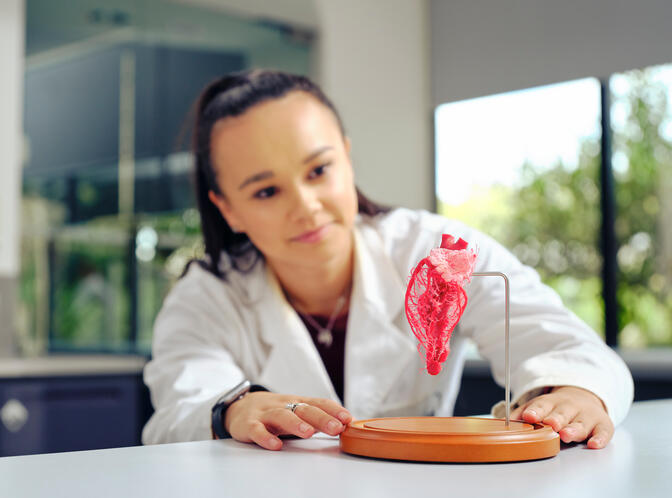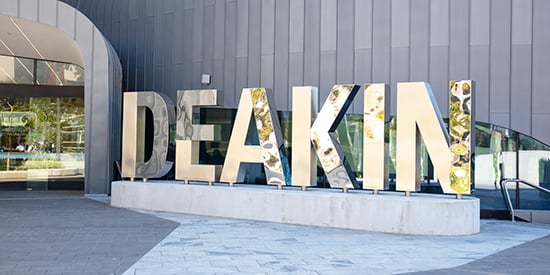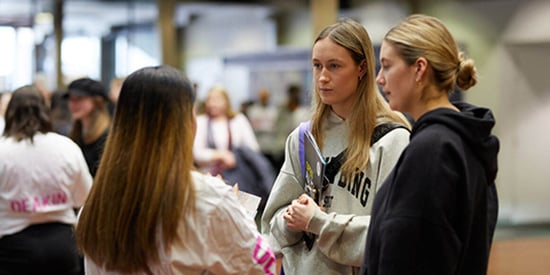Connect with health and medical science researchers
Top 1% of universities worldwide*
Pathway to masters and PhD programs
Key facts
1 year full-time
Current Deakin Students
To access your official course details for the year you started your degree, please visit the handbook
Course overview
Undertake an additional year of study across a wide range of health and medical science disciplines through the Bachelor of Health and Medical Science (Honours) degree. You will extend your knowledge and investigative skills in health and medicine and conduct an independent research project in your chosen area of interest. You can choose to go on to a career in research or take your practical expertise to the workplace.
Do you want a competitive advantage in your career or to make a valuable impact in health or medical science research?
This honours program involves an additional year of study across a wide range of health and medical science disciplines for students with an undergraduate background in the area. You will develop your knowledge and investigative skills in health and medicine, building on your previous learning and experience in your chosen area.
Alongside engaging coursework and studies in research methodology, you will pursue an independent investigative research project, with supervision available from researchers who have expertise across health and medicine.
You will become highly sought after in roles across academia, private and government industries in a variety of areas such as biological sciences and clinical research.
Course information
- Award granted
- Bachelor of Health and Medical Science (Honours)
- Year
2024 course information
- Deakin code
- H413
- CRICOS code?
- 075601K Waurn Ponds (Geelong)
- Level
- Undergraduate
- Australian Qualifications Framework (AQF) recognition
The award conferred upon completion is recognised in the Australian Qualifications Framework at Level 8
Course structure
To complete the Bachelor of Health and Medical Science (Honours) students must attain 8 credit points, including two coursework units in research methods and developing research skills and an independent research project.
All commencing Faculty of Health Undergraduate and Postgraduate course work students are required to complete
Students are required to meet the University's academic progress and conduct requirements.
Intakes by location
The availability of a course varies across locations and intakes. This means that a course offered in Semester 1 may not be offered in the same location for Semester 2. Check each intake for up-to-date information on when and where you can commence your studies.
Semester 1 - February
- Start date: February
- Available at:
- Waurn Ponds (Geelong)
Additional course information
Course duration
Course duration may be affected by delays in completing course requirements, such as accessing or completing work placements.
Mandatory student checks
All enrolled students who are working in a clinical setting who may be involved with blood sampling or invasive techniques are required to read, understand and comply with the School of Medicine Infectious Diseases and Immunisation Policy.
Workload
You should be able to commit 35 hours a week to your honours degree.
Participation requirements
This course requires you to undertake your own research. Honours is a specialised year of study that allows you to draw together the theory and practical skills gained in previous undergraduate studies and to develop an in-depth knowledge of your particular discipline through research and additional coursework.
Reasonable adjustments to participation and other course requirements will be made for students with a disability. More information available at Disability support services.
Work experience
Not applicable
Entry requirements
Selection is based on a holistic consideration of your academic merit, work experience, likelihood of success, availability of places, participation requirements, regulatory requirements, and individual circumstances. You will need to meet the minimum academic and English language proficiency requirements to be considered for selection, but this does not guarantee admission.
Please note, there are limited places in this course and entry is competitive. Applicants are strongly encouraged to submit an application as soon as possible. Applications for this course may close prior to the published closing date if all places are filled.
Academic requirements
To be considered for admission to this degree you will need to meet all the following criteria:
- completion of a bachelor degree or a major in a related discipline, with a Weighted Average Mark (WAM) of at least 65 in all level three or four Deakin units (or in final year units for awards from other providers)
- Doctor of Medicine (H911) students who do not meet these criteria will require a minimum GAMSAT score of 60 and have successfully completed a minimum of 8 credit points of the Doctor of Medicine
English language proficiency requirements
To meet the English language proficiency requirements of this course, you will need to demonstrate at least one of the following:
- Victorian Certificate of Education (VCE) English Units 3 and 4: Study score of at least 30 in English as an Additional Language (EAL) or at least 25 in any other English
- IELTS overall score of 6.5 (with no band score less than 6.0) or equivalent
- other evidence of English language proficiency (learn more about other ways to satisfy the requirements)
Admissions information
Learn more about Deakin courses and how we compare to other universities when it comes to the quality of our teaching and learning.
Recognition of prior learning
Recognition of prior learning will not be granted into this course.
Fees and scholarships
Fee information
Learn more about fees.
The tuition fees you pay will depend on the units you choose to study as each unit has its own costs. The 'Estimated tuition fee' is provided as a guide only based on a typical enrolment of students undertaking the first year of this course. The cost will vary depending on the units you choose, your study load, the time it takes to complete your course and any approved Recognition of prior learning you have. Each unit you enrol in has a credit point value.
The 'Estimated tuition fee' is calculated by adding together 8 credit points of a typical combination of units for that course. Eight credit points is used as it represents a typical full-time enrolment load for a year. You can find the credit point value of each unit under the Unit Description by searching for the unit in the Handbook. Learn more about fees and available payment options on our Current students fees website.
Scholarship options
A Deakin scholarship could help you pay for your course fees, living costs and study materials. If you've got something special to offer Deakin - or maybe you just need a bit of extra support - we've got a scholarship opportunity for you. Search or browse through our scholarships
Apply now
Applications for Semester 1, 2025 open in August.
In the meantime, why not speak to our student advisers about your course and career options? It’s the best way for future students like you to get expert advice on preparing your application.
Entry pathways
This course provides a pathway to higher degree by research courses and other postgraduate coursework programs.
Contact information
Our friendly advisers are available to speak to you one-on-one about your study options, support services and how we can help you further your career.
- Call us: 1800 693 888 Mon–Fri, 9am–5pm
- Live Chat: Mon–Thurs, 8am–7pm, Fri 8am–5pm
- Submit an online enquiry
- Help hub find common and trending questions and answers
Careers
Want a degree that’s more than just a qualification? Our industry connections, world-class facilities and practical approach to learning are just some of the reasons why Deakin students graduate confident and ready to thrive in the jobs of tomorrow.
Career outcomes
This honours year will prepare you for a career in medical research, as well as acting as a pathway to further study such as a master or PhD program.
As a graduate you will be highly sought after for academic, private and government roles in a variety of areas such as biological sciences and clinical research.
Professional recognition
Not applicable
Course learning outcomes
Deakin's graduate learning outcomes describe the knowledge and capabilities graduates can demonstrate at the completion of their course. These outcomes mean that regardless of the Deakin course you undertake, you can rest assured your degree will teach you the skills and professional attributes that employers value. They'll set you up to learn and work effectively in the future.
| Graduate Learning Outcomes | Course Learning Outcomes |
| Discipline-specific knowledge and capabilities | Apply discipline-specific knowledge to identify a gap in the literature within the chosen field of study; formulate a testable research question; develop a conceptual framework and select the appropriate methodological procedures for the collection, analysis and interpretation of data; and disseminate research findings. |
| Communication | Autonomously communicate, defend and discuss all elements of the research project in the chosen field of study via oral and written means to academics, specialists and others. |
| Digital literacy | Autonomously select and use appropriate technologies to source, interpret, adapt, collate, analyse and disseminate relevant information to an academic audience and specialists. |
| Critical thinking | Critically and constructively, evaluate, critique and synthesise the literature in the chosen field of study; select and apply appropriate methodological principles suitable for the research project; select and apply appropriate analytical techniques to test the hypothesis; and interpret, compare and contrast study findings to the wider literature in the chosen field of study. |
| Problem solving | Identify a suitable and novel research question based on the literature within the context of Health and Medical Science that can be completed within the given timeframe; address the research question in an appropriate, realistic and ethical manner; and troubleshoot solutions to resolve unplanned, unforeseen and complex problems associated with the research study. |
| Self-management | Produce a realistic timeline for the research project that incorporates the literature review, obtaining ethical approval (if applicable), sourcing and/or collecting and analysing data, and dissemination. Demonstrate effective self-management skills, autonomy and accountability that contribute to the development of lifelong learning as a researcher within Health and Medical Science. |
| Teamwork | Collaborate and work effectively with specialists, peers, academics and others from a range of disciplines and backgrounds. |
| Global citizenship | Engage in ethical and professional research practice whilst maintaining confidentiality, and respecting cultural sensitivities. |
Events Explore more events
Footnotes
*ARWU Rankings 2022
^ShanghaiRanking's Global Ranking of Academic Subjects 2018
#Year on year, our undergraduate students are the most-satisfied students of all Victorian universities. Australian Graduate Survey 2010–2015, Graduate Outcomes Survey 2016–2019 (GOS), Quality Indicators for Learning and Teaching (QILT).




